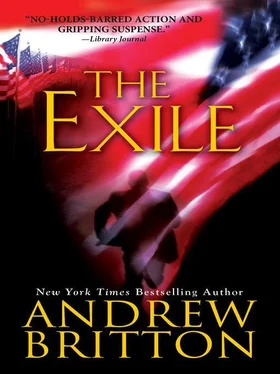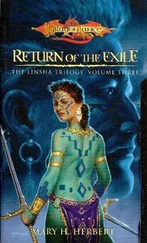Andrew Britton - The Exile
Здесь есть возможность читать онлайн «Andrew Britton - The Exile» весь текст электронной книги совершенно бесплатно (целиком полную версию без сокращений). В некоторых случаях можно слушать аудио, скачать через торрент в формате fb2 и присутствует краткое содержание. Жанр: Триллер, на английском языке. Описание произведения, (предисловие) а так же отзывы посетителей доступны на портале библиотеки ЛибКат.
- Название:The Exile
- Автор:
- Жанр:
- Год:неизвестен
- ISBN:нет данных
- Рейтинг книги:5 / 5. Голосов: 1
-
Избранное:Добавить в избранное
- Отзывы:
-
Ваша оценка:
- 100
- 1
- 2
- 3
- 4
- 5
The Exile: краткое содержание, описание и аннотация
Предлагаем к чтению аннотацию, описание, краткое содержание или предисловие (зависит от того, что написал сам автор книги «The Exile»). Если вы не нашли необходимую информацию о книге — напишите в комментариях, мы постараемся отыскать её.
The Exile — читать онлайн бесплатно полную книгу (весь текст) целиком
Ниже представлен текст книги, разбитый по страницам. Система сохранения места последней прочитанной страницы, позволяет с удобством читать онлайн бесплатно книгу «The Exile», без необходимости каждый раз заново искать на чём Вы остановились. Поставьте закладку, и сможете в любой момент перейти на страницу, на которой закончили чтение.
Интервал:
Закладка:
Kessler gripped the phone more tightly in his hand. “Who’s behind this?”
“An alliance of rebels led by Simon Nusairi,” Fitzgerald said. “I suspect your Mossad has exhaustive dossiers on him, but we’ll share all our own information.”
“It doesn’t sound like he has your backing.”
“He absolutely does not,” Fitzgerald said. “This attack must be stopped. But given the immediacy of the situation, the United States does not have sufficient resources in place, or time to move those resources to do so. And we are asking a favor of your nation that, if granted, will be something I promise you will not regret.”
Kessler inhaled. “You want us to launch a mission on behalf of Omar al-Bashir?”
“It isn’t that simple. We are cooperating with Bashir to defuse a situation with dangerous global ramifications. Should you opt to assist us, he will lift the no-fly zone over certain sections of his country to allow your aircraft total operational latitude.” She paused for a good ten seconds. “I will be up front with you, Avi. There may be diplomatic compromises forthcoming between my government and the Sudanese concerning Bashir’s status. But you have my assurance we will in no way remain passive if his regime commits further acts of blatant ethnic violence inside its borders…or attempts any aggression beyond them.”
Kessler thought he’d taken another breath, but wasn’t sure, and consciously told himself to do it. Then he tapped his computer out of its idle mode, opened his e-mail program, and noted the new message in the queue.
“I see your packet’s arrived,” he said.
“Read it and get back to me,” Fitzgerald said. “Don’t worry about another round of phone tag, either… I’ll be standing by for your call.”
It was shortly before sunset when they took the bridge over the Gash to Sikka Hadiid, having left the east side of town and gone around and past the souq in a motley procession of vehicles. Kealey, Mackenzie, and Abby kept their Cherokee behind Tariq, who was in a battered Outback with several of his fighters. The rest of their group-its head count had grown to two dozen men as they filtered into the mountain camp throughout the day-rode in a dusty Jeep Wrangler, a Volkswagen hatchback, a Hyundai wagon, and an aging Ford sedan.
On the west bank of the river the Hyundai split off from the line and pulled under the trees outside a cultivated patch of farmland. Behind the wheel of the Cherokee, Mackenzie glanced briefly in the rearview mirror.
“Wish we had more men to cover that area,” he said.
Kealey looked at him. Back in the mountains, Mackenzie had walked from camp with him and made good on his promise to expand on his familiarity with Kassala and the Sikka Hadiid. For forty years, he’d explained, fugitives from persecution during the endless civil wars in Eritrea and Ethiopia had crossed the border plateau into Sudan, many entering through treacherous passes in the Taka range. On his assumption of power, Omar al-Bashir had attempted to crack down on the flow of refugees, since many had ancestral ties to antigovernment factions within Kassala’s Beja and Rashaida clans.
“Bashir’s problem was that he had his hands full with the secessionists in the south and couldn’t commit enough forces to keep a tight fist on this area,” Mackenzie had said. “What you should know is that Mirghani hasn’t just gotten more tolerance than other opponents because he’s from the north and not an avowed separatist. It’s racial… He’s Arabic, and the divisions in this country are really between Arabic and black Muslims.”
“Like the refugees that came through the mountains,” Kealey had said.
Mackenzie had nodded. “It wasn’t so far back historically that the Arabs were making slave raids on the south. And there hasn’t been much progress in the way of attitude among the people who rule this country,” he said. “What you need to know is that the majority of refugees are black, and some are aligned with the opposition in Darfur. Over the past decade we-the Agency-did some things to assist their entering the country. That included helping them dig a tunnel between the west side of the river and some of those huts in Sikka Hadiid. They’d take temporary shelter there and get out of the city. For them it was a lifesaver while their own countrymen were burning down their villages. For us it was building another segment of the population that was hostile to Bashir…completely win-win.”
Kealey had taken a long moment to digest all that, standing in the hot sun beating down on the craggy slope. “We’re going to have to keep the tunnel’s entrance covered tonight,” he’d said. “In case Nusairi and White try using it to make a getaway.”
“Yup.”
“That means you’re going to have to let Tariq know about it.”
“If he doesn’t already. There isn’t much that gets past Mirghani or his headmen.”
“That isn’t my point,” Kealey said. “It’s one thing for them to be aware the tunnels exist. Another to find out the Agency had a role in digging them. Or that it chose to support a particular group-ethnic, political, whatever-over theirs.”
Mackenzie had shrugged his shoulders. “Them’s the breaks,” he’d said. “This is a complicated world. Now we need them, and they need us. A whole new codependency is born. We can’t worry about Tariq feeling slighted.”
All of which was true, Kealey thought now as they rolled by the decayed, sun-bleached railway station with its merging of Arabian and British architecture-the simple curve of the entry arch overlooked by Victorian gables with elaborate moldings and the remnants of a high clock tower, its dial and workings long ago removed by thieves or vandals.
With the station and its splintered, torn-up tracks at their rear, they doused their headlamps in the deepening night, then passed the buildings that had housed the British officials and finally saw the long rows of workers’ huts ahead of them in the dimness.
“We’ll be there in a couple minutes,” Mackenzie said to his passengers. “Better get ready.”
Kealey took three sets of thermal night vision goggles on headsets from a compartment under the dash, passed one back to Abby, and put the other between himself and Mackenzie. A moment later he heard Abby palm a 30-round clip into her Sig 552 5.56mm assault rifle and reached for the 552 in his seat well, setting it across his lap. Seth Holland’s knee-jerk admonition to treat the weapons with care back at the embassy had been almost the same as when he’d handed Kealey his Glock 9mm pistol before they headed out to Bahri.
Under very different circumstances, the recollection might have struck Kealey as humorous. But he found nothing remotely amusing about what was about to go down tonight, just as he could find nothing to like about the rapidly shifting political expedients and allegiances around him. On the other hand, he thought, it was worth reminding himself that his own objective was neither complicated nor ambiguous.
He wanted Simon Nusairi; it really couldn’t have been simpler, or more serious, than that.
“The commander is in the beyt there…the last in this line,” Tariq said, pointing. He had braked to a halt in front of the Cherokee, gotten out, and hastened over to speak with Mac through the driver’s side window. “There are three or four of his men in the one next to it.”
Mackenzie nodded, gazed out into the night. He could see what appeared to be firelight in the windows. “No chance he could’ve left the lamps burning to trick us and snuck off while the cats were away?”
Tariq angled his head slightly toward one of the tall, vacant officers’ buildings behind them. “My cats have had their eyes on him from the rooftops,” he said. “He and the American remain within.”
Читать дальшеИнтервал:
Закладка:
Похожие книги на «The Exile»
Представляем Вашему вниманию похожие книги на «The Exile» списком для выбора. Мы отобрали схожую по названию и смыслу литературу в надежде предоставить читателям больше вариантов отыскать новые, интересные, ещё непрочитанные произведения.
Обсуждение, отзывы о книге «The Exile» и просто собственные мнения читателей. Оставьте ваши комментарии, напишите, что Вы думаете о произведении, его смысле или главных героях. Укажите что конкретно понравилось, а что нет, и почему Вы так считаете.










